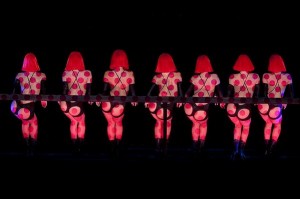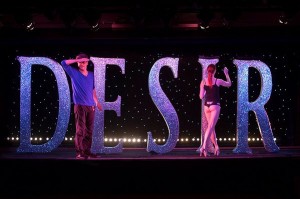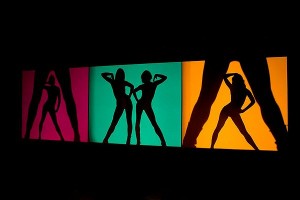
If you already have an affinity for Paris’ Le Crazy Horse cabaret, and a penchant for Frederick Wiseman’s type of cinéma vérité-like filmmaking, then—and only then—might you get something out of Crazy Horse. But don’t expect to really learn anything about Le Crazy. Don’t expect to be titillated by their attempts at creating the “best nude dancing show in the world.” Don’t expect much, because—even with an overwhelming 134-minute runtime—there’s not a whole hell of a lot going on.
Director Wiseman is a filmmaker who I’ve never personally encountered before, but who’s been making documentaries since the 1960s in—for lack of a better term—the style of cinéma vérité (Wiseman apparently balks at the term if you’re one to split hairs). What we get is Wiseman the casual observer. There are no talking-head interviews (though Wiseman skirts around this by showing people being interviewed by journalists), no voiceovers and no title cards. Everything that’s going on is left up to the viewer to piece together if at all possible. We simply observe.

On paper, this different approach to the documentary—a form that’s too often shackled by conventions that are averted here—should be refreshing. Instead, it’s often frustrating for a number of reasons. The topic should be—and occasionally is—interesting, but Wiseman refuses to give us any backstory. From the movie, we learn little more than that the subjects are trying to put on a show, and we see the various difficulties this entails. Everything I now know about famous Le Crazy, however, I pieced together later from Google searches.
The pity in this lies in the fact that a lot of the tension which bubbles up within the creative process is actually quite interesting. It helps that the people involved are all intelligent and passionate—and even a little out there. Philippe Decouflé, the show’s director, is a perfectionist with a distinct vision, but often without the support or budget to reach it. The show’s creative director, Ali Madhavi, is just as passionate and continually goes on fervently at length, waxing philosophic on the importance of Le Crazy and art in general.

But these two men, as well as Fifi Chanchil, the show’s costumer, are the only people we ever truly meet. The club’s dancers are never allowed to really show any personality. Instead, we only see them during the film’s endless amounts of rehearsal footage. (The rehearsals take up the vast majority of the film, and are all shot in the least-interesting manner possible.) We have these nude women on stage singing about eroticism, yet there’s nothing erotic about how Wiseman films the scene. Often, he just points his camera in a single spot. The lack of interaction with these women and the way Wiseman shoots them is off-putting. It flirts with objectification—though I never got the feeling this was Wiseman’s intent, but rather is an unfortunate by-product of his style.
Wiseman’s questionable approach hangs over the film. For me, this stripped-down take on filmmaking has never held much appeal. Here, it’s even worse, since we have something that’s tailor-made for cinema—musical numbers, a fantasticated light show, sexuality. What could have happily been made into spectacle—and in reality, exists as spectacle—is unfortunately brought into submission by matter-of-factness. And while I have no doubt that Wiseman is sincere in his filmmaking approach, it’s a movie that nevertheless hangs by how much you’re on the wavelength of this very detached style—a style I can’t personally say I’m in tune with. Not Rated, but obviously contains a great deal of nudity.
Warning: Trailer contains nudity!




Excellent timing for the release of this, seeing as Neil Young has just announced he’s reteaming with them for a new record.
Does ‘Cinnamon Girl’ feature in the doco, Justin?
Does ‘Cinnamon Girl’ feature in the doco, Justin?
No, but there’s a song about “baby buns” or something. I’m pretty sure Mr. Young didn’t write that one.
Maybe it’s French for “Cinamon Girl.”